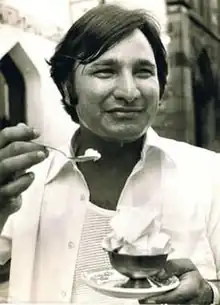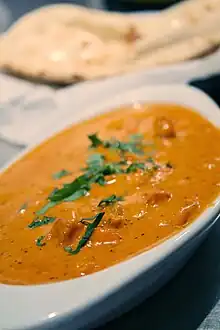Ali Ahmed Aslam
Ali Ahmed Aslam (Urdu: علی احمد اسلم; 1 April 1945[1][2] – 19 December 2022) was a Pakistani–Scottish chef who is credited with inventing the dish chicken tikka masala.
Ali Ahmed Aslam | |
|---|---|
 | |
| Born | 1 April 1945 |
| Died | 19 December 2022 (aged 77) Glasgow, Scotland |
| Occupations |
|
| Known for | Inventing chicken tikka masala |
| Children | 5 |
Early and personal life
Aslam was born on 1 April 1945 in a small village near Lahore,[3] Punjab, British India (now Punjab, Pakistan).[4] In either 1958 or 1959, he moved with his family to Glasgow as a young boy.[5] His father, Noor Mohammed, opened what is considered the first true Indian restaurant in Glasgow, the Green Gates on Bank Street, in 1959.[6]
Aslam was married and had five children.[4] One of his sons, Asif Ali, spoke to The Glasgow Times about his father's dedication towards charity work in Scotland and Pakistan.[7]
A proud Glaswegian, his nephew Ahmed said he was a perfectionist and highly driven.[8]
Chef and restaurant owner

Aslam opened the Shish Mahal restaurant in Glasgow's west end in 1964[4] and reportedly ate lunch in his restaurant every day.[8] The establishment was considered his life's work, according to friends, locals and family.[8]
Invention
Though the origin of the dish is not certain, he is credited with inventing chicken tikka masala by improvising a sauce made from a tin of condensed tomato soup, and spices.[9][10] He claimed he devised the recipe for "Britain's favourite curry" after a customer complained that his meal was too dry.[4]
Quoted, he recounted the incident as follows: "Chicken tikka masala was invented in this restaurant, we used to make chicken tikka, and one day a customer said, 'I'd take some sauce with that, this is a bit dry'. We thought we'd better cook the chicken with some sauce. So from here we cooked chicken tikka with the sauce that contains yogurt, cream, spices."[7]
The dish is widely considered an adaptation of the South Asian cuisine to suit Western European palates.[8] Aslam claimed it was his gift to the city of Glasgow and he later campaigned unsuccessfully for the dish to be granted Protected Designation of Origin status by the European Union.[8][4]
Death
Aslam died of septic shock and organ failure in Glasgow on 19 December 2022, at age 77.[4][7][11] His funeral was held at Glasgow Central Mosque the next day, with members of the public invited to attend.[4]
References
- Rao, Tejal; Kwai, Isabella (23 December 2022). "Ali Ahmed Aslam, 77, Dies; Credited With Inventing Chicken Tikka Masala". The New York Times.
- "Ali Ahmed Aslam, 77, credited with inventing Chicken Tikka Masala, dies". YRT News. 23 December 2022.
- Rao, Tejal; Kwai, Isabella (23 December 2022). "Ali Ahmed Aslam, 77, Dies; Credited With Inventing Chicken Tikka Masala". The New York Times. ISSN 0362-4331. Retrieved 29 December 2022.
- Nadeem Badshah (21 December 2022). "Ali Ahmed Aslam, inventor of chicken tikka masala, dies at 77". The Guardian.
- "Glasgow curry legend Mr Ali remembered". Asian Image.
- One Super Ali Glasgow loves, The Herald Scotland
- "Glaswegian who 'invented' chicken tikka masala dies". BBC News. 22 December 2022.
- Anjali Thakur (22 December 2022). "Ali Ahmed Aslam, 'Chicken Tikka Masala' Inventor, Dies at 77". NDTV.
- "Glasgow 'invented' Tikka Masala". BBC News. BBC. 21 July 2009. Retrieved 19 May 2017.
Mr Sarwar claimed the dish owed its origins to the culinary skills of Ali Ahmed Aslam, proprietor of the Shish Mahal restaurant in Park Road in the west end of the city. He is said to have prepared a sauce using spices soaked in a tin of condensed tomato soup after a customer said his meal was too dry.
- Godeau, Lucie (2 August 2009). "Chicken tikka masala claims its origins in Scotland". The Sydney Morning Herald. Agence France-Presse. Retrieved 19 May 2017.
- "Ali Ahmed Aslam obituary". The Times. 24 December 2022. Retrieved 24 December 2022.